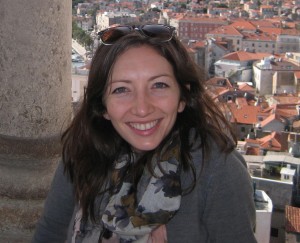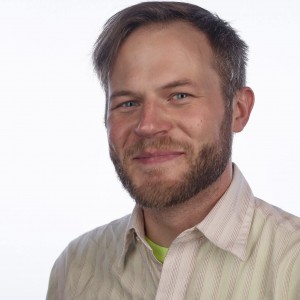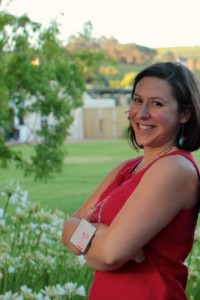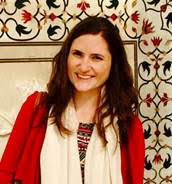Alumni putting DME concepts to work
Yesterday, the Faculty Spotlight shone on Cheyanne Scharbatke-Church, who teaches the series of classes on Design, Monitoring, and Evaluation (DME or DM&E). As Prof. Scharbatke-Church mentioned, she frequently runs into alumni in her travels and work. I’m delighted that she has shared with me brief introductions to some of those Fletcher graduates who took one or more of her classes. She developed these introductions to help students understand whether the classes are right for them. As currently configured, the classes are Design and Monitoring of Peacebuilding and Development Programming, Evaluation of Peacebuilding and Development for Practitioners and Donors, and Advanced Evaluation and Learning in International Organizations. For blog readers, there is additional value in noting the careers in which DME concepts can be applied.
 Lisa Inks F10
Lisa Inks F10
Current Position/Organization: Director of Conflict Management Programs, Mercy Corps Nigeria. I oversee Mercy Corps’ conflict management division in Nigeria, composed of various donor-funded programs integrating peacebuilding, economic development, and governance. I am responsible for setting our conflict management strategy, ensuring the programs’ success against our objectives, and leading research and M&E initiatives.
Professional interests and passions: Integrated peacebuilding and economic development programming; research on conflict/poverty linkages; governance and peacebuilding; monitoring, evaluation, and learning of conflict mitigation programs.
Things I wish I knew before taking the courses: This will be your chance to soak up theory. After Prof. Scharbatke-Church’s classes you will never feel like you have enough time to absorb the great wisdom of the M&E giants. Read every word and reflect on what you think your personal approach to DME is, and how you see this playing into your work. If you go into the rest of your career with a clear understanding of how you see yourself in the DME world and what your ideals are, you’ll be more effective.
Most valuable takeaways, and how these have helped in your career: What I learned in that class was more than a collection of tools, strategies, and facts: I adopted a completely new mindset for how to implement development and peacebuilding programs. Constant iteration is absolutely necessary for programming effectiveness. The way Prof. Scharbatke-Church modeled continuous learning and improvement is the way we should all run our programs. I think about that often: how I need to stop, evaluate, and reflect after each step of an activity — and always get the direct input of participants. (This seems obvious, but it wasn’t until I took the class that I truly internalized the importance of direct feedback and closing the feedback loop.) Also, through the class, I learned how to think logically and precisely to develop a program with a clear and testable theory of change and to monitor its effectiveness. A year after graduating I was training people throughout my previous organization in how to develop DME systems.
Other comments for incoming students who are considering the course series: If you plan to work in development at all, take this course. This class should be a “must” for anyone who wants to work in an NGO or for a donor. Prof. Scharbatke-Church’s class is rigorous, challenging, and humbling, but if you are serious about development — and are serious about doing high-quality development work that responds to the needs of those you are trying to serve, and that is based on evidence and learning — you should take it.
Brian Heilman F10
 Current Position/Organization: Independent M&E Consultant. Prior: Gender and Evaluation Specialist, International Center for Research on Women (2010-2015).
Current Position/Organization: Independent M&E Consultant. Prior: Gender and Evaluation Specialist, International Center for Research on Women (2010-2015).
Professional interests and passions: Gender equality; prevention of all forms of violence against women; engaging men and boys in efforts to advance gender quality; utilization-focused evaluation; quantitative data analysis and visualization.
Things I wish I knew before taking the courses: Honestly, the professional value of these courses is about triple that of the average Fletcher course…with a workload to match! Also, despite the modules’ titles — and I suppose not all incoming first years are immediately familiar with DM&E concepts — these courses were the most fertile ground at Fletcher for deep discussion and analysis on the ethics and effectiveness of international development and peacebuilding programming.
Most valuable takeaways, and how these have helped in your career: These courses taught me:
- To demand clarity and logic from international development program designs — but not by sacrificing imagination.
- To demand and uncover evidence of these programs’ relevance, effectiveness, and/or sustainability prior to large-scale investment — but not by allegiance to methodological “rigor” as narrowly understood.
- To demand that we value usefulness over interestingness in the application of precious program, evaluation and research resources.
These and other insights from the courses — as well as from Professor Scharbatke-Church’s broader mentorship and support — helped me come into my own as a professional evaluator, a career path that honestly I hadn’t imagined for myself prior to attending Fletcher. I have now collaborated on and led a range of evaluations and M&E collaborations in diverse settings, from the Pacific Islands to South Asia to Sub-Saharan Africa, and I apply principles from these courses throughout. I am still so grateful that I took a chance on the first DME course in my first semester — it changed everything!
Other comments for incoming students who are considering the course series: These courses are fantastic for the Fletcher student with broad interests in international development practice. If you’re like I was, you’ve got some constellation of interests including: human rights, grassroots programming/activism, data collection and analysis, development/foreign aid policy, and/or others. You can take many classes at Fletcher that dig into these areas individually but that conveniently ignore the implications of the others — especially the crucial question of how best to ensure that your program/practice/policy continues to learn from itself and improve over time.
These courses bring all of those topics together, but perhaps more importantly, they do so while also taking the notion of the “professional degree” very seriously. They are designed and taught very thoughtfully as preparatory courses for professionals. The projects and work you undertake mirror the projects and work you will undertake after graduating: Teamwork. Project designs and proposals. M&E plans. Data collection guides.
Current Position/Organization: Conflict Stabilization Specialist, Bureau of Conflict and Stabilization Operations, U.S. State Department.
I support broader State Department and interagency efforts to advance U.S. foreign policy by applying conflict expertise and supporting embassies in countries and regions affected by conflict. I design and implement conflict prevention and stabilization programs and advise on U.S. government policy. I am expected to quickly gain familiarity with specific conflict-impacted countries to identify gaps where my Bureau’s tools, including strategic planning, conflict assessment, financial assistance, and deployable staff, can enable the U.S. government to develop better policy and programs leading to improved outcomes. I’ve served in Afghanistan, Burma, and Bangladesh.
Professional interests and passions: Countries transitioning from conflict to peace, conflict prevention, reconciliation mechanisms, trust-building, civil-military relations, gender.
Things I wish I knew before taking the courses: I wish I had known the DM&E classes I took at Fletcher would be by far the most practical, relevant courses I would take in graduate school. I also wish I knew more M&E vocabulary before starting the course. I had only been in the workforce for a few years before Fletcher, with limited program design experience, so much of the lingo was new to me.
Most valuable takeaways, and how these have helped in your career: I am more strategic, always asking myself what changes I would need to see, in individuals and societies I work in, to determine whether the money, time, and effort we spent was “worth it.” The course also taught me the importance of going beyond calling an intervention a success solely because it met its originally stated objectives and goal. I learned to ask the even tougher question, like … was it the right intervention in the first place? Did it have the intended outcomes and do those outcomes amount to something greater, a larger impact? Could it have been done more efficiently? Will it be sustainable? I just wrote an evaluation scope of work for one of our projects and I relied heavily on what I learned in DM&E class – looking back at course material as I drafted it!
Jennifer Catalano F11
 Current Position/Organization: Director, Youth Economic Participation Initiative at the Talloires Network (Tufts University).
Current Position/Organization: Director, Youth Economic Participation Initiative at the Talloires Network (Tufts University).
I oversee a 4.5-year demonstration grant program at the Talloires Network, an international association of universities committed to civic engagement. This program provides sub-grants to eight universities in the global south in order to expand and learn from their efforts to prepare students for entrepreneurship and employment. Additional program elements include a learning partnership with the University of Minnesota and a global community of practice around the topic of higher education and youth employment/entrepreneurship.
Professional interests and passions: Gender, youth, ethics, the aid system, higher education.
Things I wish I knew before taking the courses: It’s rather intense, and has a significant workload, but I had heard that through the grapevine. Actually the intensity set me up well for the rest of grad school.
Most valuable takeaways, and how these have helped in your career: So many things…I drew on Program Design skills during the first phase of my post-Fletcher work, which involved coordinating the process of designing the program I now work for.
The M&E knowledge has been extraordinarily helpful during the past year. The program I work on includes a significant multi-year monitoring/learning effort. My M&E studies helped with the process of selecting an evaluation team and working with them to set up the collaboration. The whole process would have been daunting if I hadn’t known how to create a TOR, the right language to use, what to look for in evaluators, etc. Knowing this process so well also helped me to advocate for decisions that were in line with my values.
Now as we move into a phase of active collaboration with our learning partners, my M&E skills enable me to contribute in a far more substantive and meaningful way to the process.
Other comments for incoming students who are considering the course series: This is one of the most practical and useful courses you could take at Fletcher if you intend to work anywhere in the aid chain. I highly recommend it.
